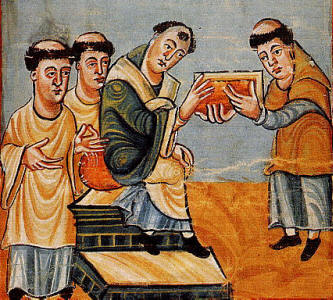 Blessed are the peacemakers for they shall be called children of
God. But sometimes their efforts are not appreciated by the children of men. So
it was with Gregory IV. Gregory IV was a Roman of noble family, ordained priest
by St. Paschal. He became cardinal-priest of St. Mark. He was a handsome man
with an excellent reputation. Gregory was elected without difficulty, but the
imperial envoys insisted that his consecration should be held up until the
Emperor confirmed the election. This took some time, and it was not until March
828 that Gregory was consecrated. Europe at this time is entering a period of
darkness and agony.
Blessed are the peacemakers for they shall be called children of
God. But sometimes their efforts are not appreciated by the children of men. So
it was with Gregory IV. Gregory IV was a Roman of noble family, ordained priest
by St. Paschal. He became cardinal-priest of St. Mark. He was a handsome man
with an excellent reputation. Gregory was elected without difficulty, but the
imperial envoys insisted that his consecration should be held up until the
Emperor confirmed the election. This took some time, and it was not until March
828 that Gregory was consecrated. Europe at this time is entering a period of
darkness and agony.
The long ships of the Norsemen scoured
the coasts and stabbed up the rivers. Saracen galleys made the Mediterranean
coasts horrid with cries of grief and pain. The Saracens were tearing Sicily
from feeble Byzantines and getting a foothold in Southern Italy. The Avars were
raiding the Eastern Marches. And all the while the descendants of Great Charles
were earnestly ruining the empire with their bitter and bloody family fights.
Pope Gregory did what he could to defend Christendom from these evils. He was
persuaded by Lothair, the Emperor's oldest son, to cross the Alps to mediate
between the sons and the father. When Gregory reached Alsace, he was welcomed by
an angry protest from bishops favorable to Emperor Louis. Gregory told the
malcontents plainly that they should not forget that "the government of souls,
which belongs to the supreme pontiff, is greater than the imperial power which
is temporal." But Gregory failed in his attempt at mediation and must have felt
frustrated on that "field of lies." Later on, after the death of Emperor Louis,
Gregory tried to bring peace to the quarreling sons. But the brothers smashed
each other on the disastrous field of Fontenay in 841, and the empire was
divided by the famous treaty of Verdun in 843. From the East Gregory received
more consolation.
The iconoclast persecutor Theophilus was
dead, and his widow, the Empress Theodora replaced the iconoclast Patriarch John
with the Orthodox Methodius. A synod was held in 842 which restored the
veneration of holy images. St. Ansgar visited Rome and Gregory gave him the
pallium and made him papal legate to the countries of the North. Gregory also
extended the feast of All Saints on November 1 to France and Germany.
Peace-loving though he was, Gregory had to take military measures to protect the
Papal States against the Saracens. He built a fort at Ostia near the mouth of
the Tiber to defend Rome from these bold marauders. Gregory IV died in January
844.
Excerpted from "Popes
Through the Ages" by Joseph Brusher, S.J.

